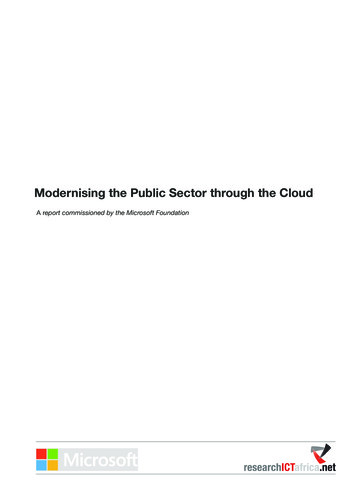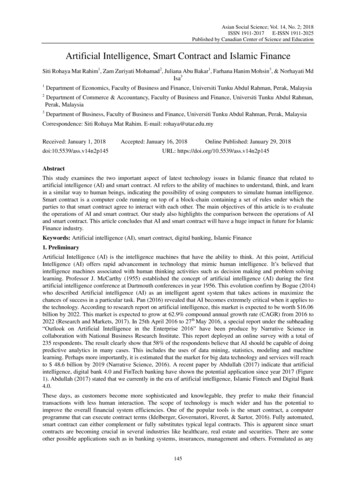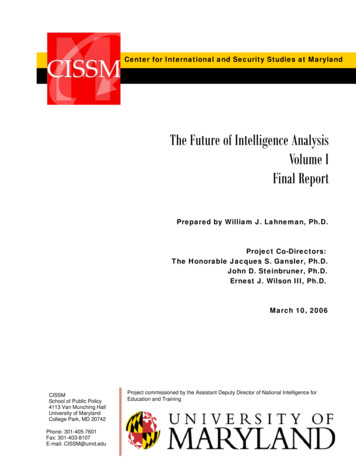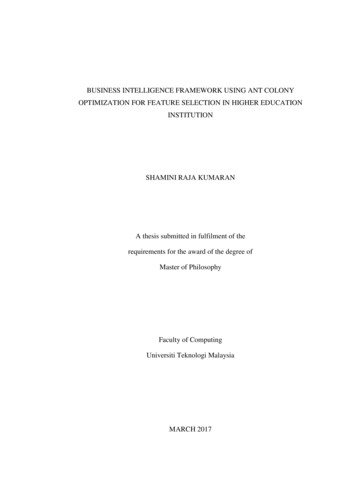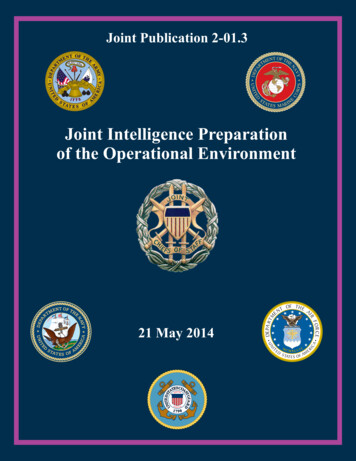
Transcription
Sector Intelligence Workshop: Technology10th May 2019
The graduate market in the UK441,000 PROFESSIONALLEVEL JOBS WERE ADDED TOTHE ECONOMY291,000 NEW GRADUATESENTERED THE WORKFORCE(ACROSS ALL LEVELS OFQUALIFICATION)Dr Charlie Ball analysis of the Destinations of Leavers fromHigher Education (DLHE) survey, HESA73.9% OF EMPLOYEDGRADUATES WERE IN APROFESSIONAL-LEVEL JOB(UP FROM 71.4%)GRADUATE UNEMPLOYMENT(5.1%) WAS AT ITS LOWESTLEVEL SINCE 1979.
48% of undergraduate finalists are still in the “decide” stage of their career thinking(HEFCE Learning Gain Project: Careers Registration)
The graduate labour market is unevenly distributedand graduates are not particularly mobile 69% of graduates go to work in the same region where they grew up13% move to go to university and stay there for workIt is vital to work with your local university on talent attraction.London is the only major city with an oversupply of graduatesDr Charlie Ball analysis of the Destinations of Leavers from Higher Education (DLHE) survey, HESA, 2016-2017
87.5% of leavers said they were satisfied with their career to date after 3.5 years(HESA Longitudinal DLHE)
Over time, graduates earn significantly more than non-graduatesDepartment for Education,Graduate labour market /government/uploads/system/uploads/attachment data/file/701720/GLMS 2017.pdf
The graduate market in the UK
The graduate market in the UKDr Charlie Ball analysis of the Destinations ofLeavers from Higher Education (DLHE) survey, HESA
The graduate market in the UKUK technology, engineering, and maths graduates in the year 2016/17, making up over 10%of that year's total graduating cohort.IT GRADUATES: 13,490
The graduate market in the UK
The proportion of corporateemployers who say graduateslack specific skills orbehaviours
The graduate market in Nottingham
The graduate market in Luminate blog: These citiesgive graduates the best valuefor their salaries
The East Midlands has a lower percentage of thepopulation with degrees than many other regions
Sector trends Artificial intelligence & machine learning Cloud-based and edge computing Combinations of technology: rather than creatingbrand new tech (eg using cloud and edge computingtogether) Personalisation vs privatisation: balancingcybersecurity and user experience Environmental smart tech: sensors to measuringimpact (eg air quality) or createefficiencies/innovation (eg solar power)
Challenges Impact of robotics and artificial intelligence: IT companiesare resorting to the recent advancements in the ITtechnology like robotics and artificial intelligence leading toemployees losing their jobs. These tasks were previouslyperformed by manual labour and were replaced by recenttechnologies to lower risk of error and increase efficiency. Cybersecurity: The tech industry companies must speed upthe finding and resolution time for a security breach toprotect themselves from the increased number of securitybreaches. Maintaining innovation: IT industry players need to keepthemselves updated and incorporate new technologies tosurvive in this highly competitive market where the numberof big and small players are increasing continuously.
Challenges
Challenges
Threats
Horizon scanningAccurately Anticipating Market Demand A lot of companies get into trouble because they baseproduct development on what they hope will be a futuredemand, and all too often that market demand nevermaterialises. While sometimes the results are inspiring,they can also lead to failure. That’s why it is critical to be more measured, takingsteps and not leaps based on current market demandand how it is likely to change over time.
Discussion What are the key challenges facing your sector in the next 5 years? What skills, knowledge or behaviours will your business and sectorneed in order to meet these challenges? Are there any specific trends you see as being particularly businesscritical? Where do you see the industry going in the longer term?
Recruitment challenges There are an estimated 600,000 tech vacancies in the UK, a figurepredicted to jump to 1 million by 2020. This costing the UK economyan estimated 63 billion a year in lost additional GDP (Tech Nation) There is a significant gender disparity within the IT sector, wherewomen are underrepresented, making up only 17% of ITprofessionals. (House of Commons, Science and TechnologyCommittee) The industry relies on EU citizens to fill about 180,000 jobs in thesector (Recruitment and Employment Confederation)
Recruitment challenges
Case study
Skills shortages
Skills shortages
Discussion What challenges do you face when recruiting graduates? Are there any roles or areas where you have found it much easier torecruit? Why? Are there any roles or areas where you have found it much harder torecruit? Why? When you have made excellent graduate hires what has made themso successful?
DesirableSkills mapping exerciseHard to find
The NTU talent pool foryour sector 973 (UG & PG for Technology related courses) for 18/19
Undergraduate course provisionComputer Science cluster: BSc (Hons) Computer Science BSc (Hons) Computer Science (Gamestechnology) BSc (Hons) Software EngineeringComputer Systems cluster: BSc (Hons) Computer Systems Engineering BSc (Hons) Computer Systems (Networks) BSc (Hons) Computer Systems (Cyber Security)Information Technology cluster: BSc (Hons) Computing BSc (Hons) Information SystemsData Science: BSc (Hons) Data ScienceThe BCS (British Computing Society) hasaccredited all of our undergraduate degrees
Postgraduate course provision MSc Computer Science MSc Computing Systems MSc IT Security MSc Cloud & Enterprise Computing MSc Engineering (Cybernetics & Communications) MSc Engineering (Electronics) MSc Engineering Management MSc Data Analytics for Business Online MBA with Data Analytics MRes Electronic Systems MRes Computer Science
BSc Computer Science
BSc Computer Systems Engineering
BSc Software Engineering
Example roles and salariesSoftware Engineer Graduate- 25KSoftware Developer Graduate- 22KCyber Security Graduate- 29KSoftware Developer- 25KDeveloper- 22KSoftware Engineer- 29K
Case studies and opportunities toengage with NTU Computing & Technology Degree Showcase (held annually –2nd May 2019) Work in Tech – series of employer talks promotingplacement opportunities (delivered in Term 1) LoveTech (event held annually in February – employerspromoting placement and graduate opportunities) Live projects Computing & Technology ‘Digital Horizons’ (held in Term 1,includes work shadowing, insight days, visits to employers,employer challenges)
‘We see graduate recruitment as a critical component of our expansion strategyand continue to seek out new, talented graduates from NTU to support the growthof the business. Many graduates stay with us for the long term as they continue todevelop their careers.Jack has been instrumental in introducing cutting edge DevOps tools and processesinto the business, and sharing those experiences throughout the developmentteam, which is significantly increasing our software development efficiency.Our ongoing relationship with NTU provides us with an opportunity to work withcapable graduates and placement students who bring huge potential to theorganisation and are underpinning our long-term plan for growth.’
‘The recruitment fairs at NTU are a critical part of our efforts to source new talentand having such a local talent pool has been fantastic for us.We have found that the graduates have an advanced capacity for learning as well asbringing fresh ideas and new perspectives as well as rapidly becoming productive.After our first contact with NTU, the Employability team have continued to beextremely helpful and supportive; keeping us informed on recruitment events andsupporting us in promoting our graduate opportunities both on Future Hub,targeting students by email and helping us to get the most out of the recruitmentfairs.’
Graduate attraction plan
Research and references links (if not stated onslides) Accenture technology vision - y/technology-trends-2019 Alphr tech skills gap - fix-it Axis Communications insights - nds-2019/ Bidwells UK skills gap - lments/ CompTIA industry outlook - ds-analysis Computer Weekly - -Brexit-IT-talent-shortages-concern-UK-CIOs CSG bridging skills gaps - ills-gap-technology-sector Exertis skills gap cost - -costly-business/ Explore Group - ills-report-what-you-need-to-do-now/bp33/ Fortune tech challenges - ges/ Hired UK tech sector skills gaps - https://hired.com/blog/highlights/mind-the-gap/ House of Commons Science and Technology committee elect/cmsctech/270/270.pdf
Research and references links (if not stated onslides) IET skills and demand in industry - ey-infographic.pdf Information Age skills gap - -tech-sector-123467852/ ITpro cyber security skills gap - for-cyber-securityskills-hit-crisis-point McKinsey & Co sector in 2030 - trends-and-questions-to-consider Nesta creative talent - html? ga 988 Nesta future of skills - ls-employment-in-2030/ New Statesman - /01/digital-skills-gap-teacherknows-best NYSE tech industry challenges - -challenges Shadbolt Review t/uploads/system/uploads/attachment -science-graduate-employability.pdf Telegraph technology intelligence - nt-outside/
The East Midlands has a lower percentage of the population with degrees than many other regions . brand new tech (eg using cloud and edge computing together) Personalisation vs privatisation: balancing cybersecurity and user experience Environmental smart tech: sensors to measuring . (UG & PG for Technology related courses) for 18/19 .



